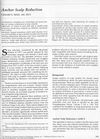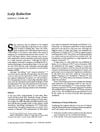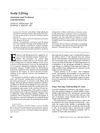American Society for Dermatologic Surgery, Inc.
December 1989
in “
The Journal of Dermatologic Surgery and Oncology
”

TLDR New techniques and findings in dermatologic surgery show improved pain management, safer liposuction, better hair transplantation, and effective treatments for skin conditions.
The document summarizes findings and discussions from the American Society for Dermatologic Surgery's annual meeting in 1990. It includes a variety of studies and techniques related to dermatologic surgery. One study of 102 office procedures found iontophoresis effective for painless anesthesia. A double-blind study with 48 volunteers showed that sodium bicarbonate added to anesthetic solutions reduced injection pain without compromising efficacy. Research on the tumescent technique for liposuction indicated safe lidocaine dosage limits and reduced toxicity. Hair transplantation techniques were improved for abnormal scalp tissue, with presuturing increasing alopecia reduction area by 30%. Maxon was preferred over Vicryl for suturing, and hyperbaric oxygen therapy was considered for stressed skin flaps. Pyruvic acid and resorcin were effective for chemical peels, and electrofulguration was a cost-effective alternative to laser for angiofibromas. A study involving 8 patients found the Permark Enhancer provided better pigment matches for vitiligo. Another study showed a surgical technique for excising hair follicles was effective for severe facial hirsutism in young Iranian females.





